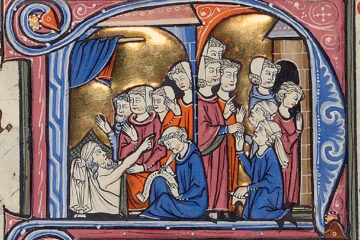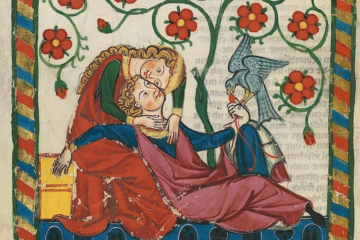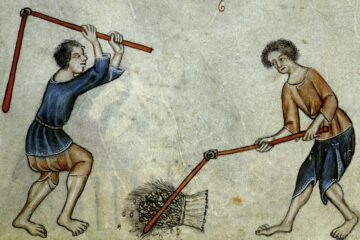by Harry Gulcher, Master of History in Rosewood
The Middle East was left carved up after the First Crusade, and as such has impacted the flow of history significantly. In the chaos after the Death, the smaller Christian Kingdoms banded together to form the Kingdom of Jerusalem.
Jerusalem as a territorial entity somewhat preserved the spirit of the then dying Byzantine Empire. The Purple Eagle was poisoned by the Rum Sultanate, its lands slowly chipped away, until recently that is. Jerusalem took over the role of protector of Christian pilgrims, even vowing to protect those of different faiths within its walls. Jerusalem is truly God’s land where all men can be equal. No matter if peace is prevalent within its walls, war was brewing on the outside.
1086 saw many diplomats sent from Jerusalem down south to the neighboring Caliphate. To understand Jerusalem’s next move, one must be aware of the political landscape of the region at the time. What remained of Alexander’s conquests in the east fell apart to war and rebellion, and with the rise of Islam, these Kings or Emirs would embrace the religion in order to ascend and claim land for themselves. Across the ages, the fertile, rich, and exotic region of Persia, the cradle of civilization, has been a war ground for many an Empire, all vying for its strategic position and ample resources. In the Persian region, in 1086 and today, stands the Seljuk Turk Sultanate, and its ruler at the time Malik Muhammad II Seljuk, Sultan of Sultans. One of the strongest forces in the world, rivaled only by the Cumans and the Fatimids. Our conflict begins with their closest rival, another one of Alexander’s offspring, the Fatimid Caliphate.
The Caliph’s position is unique in the Muslim world. He represents something of an Emperor and Pope for them. The Fatimids control their two holy sites of Makah and Medina. Logically, the two sons of Alexander would be at odds. It would seem that the most well-educated people in Jerusalem knew this. So a plan was formed. Jerusalem would help the Fatimids in exchange for territory against the Turks. It seemed perfect. The Fatimids would establish themselves as the leaders of Islam, Jerusalem would get the land which it laid claim to and the mighty Turks would be knocked down a step. The issue proved to be the military might of the Seljuks, for even the best maps in Europe chart its end before the Indus river. We know of the existence of lands and empires to the east, but none of our cartographers have been able to relay useful information or maps that correspond with the Muslim ones, their maps are much better charted than ours, unfortunately.
It was no doubt silver-tongued individuals who plotted to start a war with two of the strongest powers in the world. It succeeded. Augustus I Hasmon, ruler of Jerusalem, protector of the Christian Faith, warrior of Christ, King of Kings declared holy war on the Seljuk Turks and called the Fatimids to his aid. Little did he know that his allies would soon assume the lead role in the war, due to their sheer strength in numbers. Augustus called the aid of all Christian rulers. In response, and under recent pressure, His Holiness Pope Alexander I called for a Crusade against the Saracen Turks.
A letter calling for war, acquired in 1098 from the King of Poland.
By God’s righteous glory and His everlasting wisdom, I call upon every able man and woman of the Christian faith to cease all hostilities, gather their troops, arms, and armor, raise the banner of Christ and ride for the Kingdom of Jerusalem to aid the good King Augustus in his mission to defend Christendom from everything that endangers it.
The coming months, maybe even years will be plagued by hardship and death. But know this, good men and women, every ounce of suffering on this path offers piety and favor with our Lord. If your body were to fall in the ensuing war, if you were to be slain on the field of battle against those who reject our Savior, then your soul would be clean of any and all sin.
Rejoice, brothers and sisters of the Christian faith, for our enemy is weak, there is much glory to be won and many victories to be had, the power of Christ compels us to defend His name and His land. Jerusalem must not fall, because God wills it as such. The banner of Christ must not fall, for God wills it so. Rejoice, for we have the goodwill of our Lord, and they will have nothing but ashes and defeat.
On our side will be the good and the fair, both rich and poor, man and woman. On the other, the enemy, filthy and rotten, evil and heartless. Our resolve must not waver, and may anyone who put off their journey to the Holy Land, be struck with regret deeper than the darkest pit of Lucifer’s own. A Crusade is upon us and we shall not kneel. Deus Vult!
Pope Alexander I
In response, the Knights Divine, led by Grandmaster Solomon Bennett amassed their forces and rode and sailed towards the Holy Lands of Jerusalem. The call served to end most wars in Europe and prompted the mobilization of some 2.000 volunteers, Crusaders. It was said that anyone who was to fall under the banner of Christ, for Christ, would be absolved of all sin and granted Heaven. With the 2.000 men, half of which were from Byzantium, came the full force of the Knights Divine, who were lying dormant for years, growing in knowledge and number. 12.000 Divines were marching for Jerusalem, eager to join the fight and defend the Cross. Jerusalem had some 3.000 men and the Fatimids around 20.000. The King of Sicily, allied with Jerusalem, joined the war and offered its 2.000 strong army to aid them in their struggles. Alongside this massive force, the Fatimids’ ally Anizah contributed a further 8.000 men. Together with the addition of an Italian mercenary company, numbering exactly 3.150 men and 100 ships, the Christian forces numbered around 50.000, while the Seljuks, along with their ally Mosul and a Persian mercenary company, numbered anywhere between 40.000 and 45.000 men.
It is with great regret that I must admit that the historical accounts of this event contradict depending on the source. Therefore a concrete flow of events is impossible to construct. However, one battle seems to be agreed upon, coincidentally the greatest one.
The Battle of Al-Nukhib, 7th July 1087
The opposing forces met at the two sides of a river. One one side the Crusaders, led by Grandmaster Solomon Bennett, Lord Marian of Sicily and the Caliph of the Fatimids himself Caliph Ma’ad II “the Golden Sun”. The other side was host to the Muslim forces, led by the Padishah of the Seljuks, Padishah Malik II, Sultan Ibrahim II of Mosul, and Sheik Darius, commander of the Persian mercenaries.
The battle seemed to favor the Muslims, as their forces outnumbered the Crusaders who were only at half strengths for some reason. The battle began with the Persian mercenaries rushing the Crusaders, crossing the river, and running straight into them. Their resolve was unmatched, and even though they suffered heavy losses in the initial shock, they stood their ground and managed to pin the Crusader center. Once a crossing ground was secured, the rest of the Muslim force began marching to hit and encompass the Crusaders’ flanks. Right then, when the battle began to look dark for the warriors of Christ, 10.000 Divine Knights charged at the Muslim flanks, both ambushing them and cutting off their main point of retreat. The tactical maneuver by Grandmaster Solomon turned the tides and soon the Muslims found themselves losing more men than they were slaying. The Persian mercenaries dropped their arms and fled the field of battle, which only increased the number of casualties. By the end, the Muslims lost 7.000, left 8.000 wounded, and counted no more than 5.000 deserters, while the Crusaders had 8.000 dead, 5.000 wounded and 4.000 missing. The nearby Iraqi city was put under siege in October, but a large force of Seljuk Turks was expected to arrive from the east, as many as 20.000 fresh troops. The Crusaders’ only hope was to breach the city and seek shelter there until their reinforcements arrived. The siege did not break, but instead of a large army, the Seljuks only sent a lone rider, offering peace. In a few fortnights, the Crusade was officially over and peace was made.
Most suggested that God had destroyed the enemy army in the vicious deserts of the region. Later investigation proved a much simpler reason. Namely, some of my Muslim associates claim that a revolt in the Persian provinces forced the Padishah to sign an early peace since he could not afford to fight two wars on opposite sides of his land. The Fatimids expanded rapidly, Jerusalem got its lands and even Byzantium was given a reward for its assistance in way of men and supplies. This war shifted the balance of power in the region, with the Fatimids assuming the leading role in the region. Hopefully, Jerusalem’s involvement in the conflict will help further warm relations between the two Kingdoms and not serve to make the Crusader Kingdom into a subject for the Caliph to do with as he pleases.


